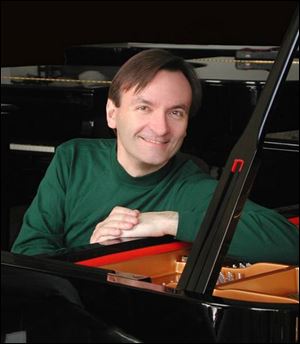
Pianist illuminates the essence of the music he plays
11/6/2005
Pianist Stephen Hough will play Wednesday night in the Toledo Museum of Art Peristyle.
Had Stephen Hough not become a pianist, he would have made a dandy scientist. He excavates, polishes, and catalogs his musical subjects with archeological precision. Sonic interpretations are nuanced anthropologies bound to social time and place.
As befits an inquiring mind, Hough balances his pragmatic attention to detail with the consideration of universals. This latter is the Zen-like side of the artist. He believes that in order to be successful mediators between composer and audience, performers need to learn how to stay out of the way. Musicians must be able to reach beyond ourselves by looking beyond our selves, said Hough.
He will play the music of Mozart, Schumann, and Liszt/Busoni at 8 p.m. Wednesday in the Toledo Museum of Art Peristyle.
Playing the piano at the professional level demands the skill and focus of an Olympic athlete, yet a performer s greatest challenge often comes from his own ideas of self-importance, Hough said.
It boils down to inflated or distorted egos: the desire to be admired, successful, or praised. There s a sense in which these desires contain perfectly natural reflexes. But there s also the potential for enormous strain and self-destruction, he said.
If we walk onto the stage with an excessive hunger for approval or adulation we stifle something inside us. Such self-absorption rarely makes sense. It s like driving on the highway and looking too closely at the car in the next lane; the lack of perspective is dizzying and dangerous.
Winner of a 2001 MacArthur Foundation Fellowship genius award, the London-based Hough is a modern Renaissance man. He focuses on performing, but also finds time to write essays and compose. Hough s piano transcriptions range from music of 19th-century Romantics to Rodgers & Hammerstein.
I just have the curiosity which comes from wanting to do what I do to the best of my ability. If people become totally absorbed by a hobby, wanting to know as much as possible, how much more it should be the case with one s life work, he said during a recent interview for a French Web site.
Never showy on stage, but with musicianship alone, Hough has created a broad fan base. He treads agilely along the slippery path between imitation and innovation.
Hough informs his performances by undertaking exhaustive studies of composers and previous performers with the idea of digesting their ideas, styles, and mannerisms. That accomplished, he puts all that study aside, listens to his own inner voice, and gives the music his own particular spin.
Perhaps an outgrowth of his calculated freedom is Hough s recital programming, which, like Wednesday s performance, is designed to highlight context, to compare and contrast periods and genres, the specific with the general. Wednesday s Peristyle concert spins around both Mozart, whose 250th birthday is being celebrated this season, and the loosely organized musical form known as the fantasy.
The energy of Hough s programming comes from the way he interweaves the two. Mozart s music is featured in four works; pieces by Mozart, Schumann, and Liszt (based on an operatic theme by Mozart) are titled as fantasies.
Then there are Hough s own reharmonizations of three short Mozart pieces, including one of the first the child composer ever wrote. Here, what Hough has created are really fantasies of time and place, as if Mozart had lived amid the harmonic elegance and rhythmic vibrancy of mid-20th century France.
At the relatively still center of this cycling musical program resides Mozart s 1783 Sonata in B-Flat, music composed with delicately controlled melodic transformations that subtly undermine this most logical of musical forms. Curiously, the music was written in a period when the composer s own life was decidedly out of balance, in need of transformation.
Hough made his first mark in the professional world in 1983 when he claimed first prize in the Naumburg International Piano Competition. Since then he has made more than 40 recordings.
He last appeared in Toledo in March of 2002 along with conductor Stefan Sanderling and the Toledo Symphony.
Pianist Stephen Hough plays music of Mozart, Schumann, and Liszt/Busoni at 8 p.m. Wednesday in the Toledo Museum of Art Peristyle. Tickets range from $22 to $45. Information: 419-246-8000.
Contact Steven Cornelius at: scornelius@theblade.comor 419-724-6152.